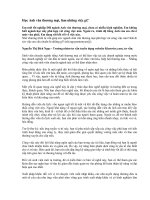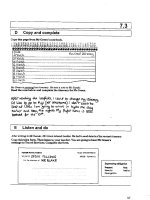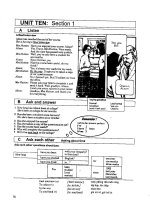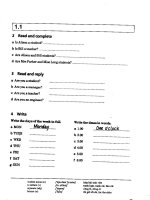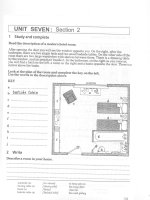Glossary 2023 Anh văn thương mại
Bạn đang xem bản rút gọn của tài liệu. Xem và tải ngay bản đầy đủ của tài liệu tại đây (423.19 KB, 5 trang )
Business English
Glossary
Vocabulary for final examination
1. Conference: a meeting at which people have formal discussions.
potential customers
2. Potential
customers: people who will buy company’s products in the future.
3. Customer’s
feedback: advice, criticism or information of buyers about how good or
customer feedback
useful something is.
4. Consumer:
consumer a person who buys and uses goods or services.
5. Negotiate:
negotiave try to reach an agreement by formal discussion.
salary money that employees receive for doing their job, especially professional
6. Salary:
employees or people working in an office, usually paid every month.
7. Wage:
wagemoney that someone earns according to the number of hours, days, or weeks that
they work, especially money that is paid each week.
8. Discount:
discount an amount of money that is taken off the usual cost of something.
9. Trade
tradefair:
fair an event at which many different companies show and sell their products.
10. Enquiry:
enquire a request for information about something.
11. Qualification:
a skill or type of experience that you need for a particular job.
qualification
12. Motivation:
motivation making somebody want to do something, especially something that involves
hard work and effort.
survey an investigation of the opinions, behavior, etc. of a particular group of people,
13. Survey:
which is usually done by asking them questions.
research a careful study of a subject, especially in order to discover new facts or
14. Research:
information about it.
15. Profit:
profit the money that you make in business or by selling things after paying the costs
involved.
16. Loss:
loss money that has been lost by a business or an organization.
17. Revenue:
revenue the money that a company receives from its business.
interest rate
18. Interest
rate: money charged to a borrower or paid to an investor, usually expressed as a
percentage per annum.
1
inflation a general rise in the prices of services and goods in a particular country,
19. Inflation:
resulting in a fall in the value of money.
advertisement a notice, picture or film telling people about product, or service.
20. Advertisement:
21. Promotion:
promotion activities done in order to increase the sales of a product or service; a set of
advertisements for a particular product or service.
employer a person or company that pays people to work for them.
22. Employer:
23. Accountant:
accountant a person whose job is to keep or check financial accounts.
24. Manufacturer:
manufacturer a person or company that produces goods in large quantities.
supplier a person or company that supplies goods.
25. Supplier:
26. Distributor:
a person or business responsible for making goods available to customers
distributor
after they have been produced, either one that sells directly to the public or one that sells
to shops, etc.
27. Asset:
asset a thing of value, especially property, that a person or company owns, which can be
used or sold to pay debts.
28. debt
Debt: a sum of money that somebody owes.
29. loan
Loan: money that an organization such as a bank lends and somebody borrows.
sale presentative
30. Sales
representative: an employee of a company who travels around a particular area
selling the company’s goods to shops, stores, etc.
31. Salesperson:
sale person a person whose job is to sell goods in a shop, store.
recruit to find new people to join a company, an organization, etc.
32. Recruit:
33.internship
Internship: a period of time during which a student or new graduate gets practical
experience in a job.
passport
34. Passport: an official document that identifies you as a citizen of a particular country, and
that you may have to show when you enter or leave a country.
35. Budget
airline: a company that provides cheap flights.
budget airline
36. Retailer:
retailer a person or business that sells goods to the public.
37. Wholesaler:
wholesaler a person who buys goods in bulk from a producer and then sells them in
smaller quantities to retailers or other wholesalers, earning a profit either by charging a
commission to the retailer or by adding to the manufacturer’s price.
headquater a place from which an organization is controlled.
38. Headquarters:
39. branch
Branch: a local office or shop/store belonging to a large company or organization.
2
40. Subsidiary:
subsidiary a business company that is owned or controlled by another larger company.
41. Chain
store: store that is one of a series of similar shops/stores owned by the same
chain store
company.
42. Warehouse:
warehouse a place where large quantities of goods are stored, especially before they are
sent to shops, stores to be sold.
43. Inventory:
inventory the amount of stock, including raw materials, supplies and finished goods that
a company has at a particular time.
exchange rate
44. Exchange
rate: price at which one currency may be exchanged for another.
45. Cost:
cost the amount of money that you need in order to buy, make or do something.
ecommerce the buying and selling of products and services on the internet.
46. E-commerce:
order a request to make or supply goods.
47. Order:
48. Credit
card: a small plastic card which can be used as a method of payment, the money
credit card
being taken from you at a later time.
cash card
49. Cash
card: a special plastic card given to you by a bank that allows you to take money
out of your account using a cash machine.
50. Glocalization: the idea that companies should think globally, but use methods in each
particular place that are suited to it.
glocalization
51. customize
Customize: to make or change something according to the buyer’s or user’s needs.
52. Customs:
customs the government department responsible for collecting the tax on goods that
have been brought into the country and making sure that illegal goods are not imported or
exported.
53. Tax: an amount of money that you must pay to the government according to your
income, property, goods, etc. that is used to pay for public services.
range a set of products of a particular type.
54. Range:
55. Differentiate:
to make something different from other things.
diffirential
56. Jump to conclusions: to decide to soon that something is true.
jump to conclusion
AIDA (awareness / attention, interest, desire, action) a description of how
57. AIDA:
advertisements for a product should work, by first catching people’s attention and making
them interested in the product, and then persuading them to want to buy it.
58. Auction: a public event at which things are sold to the person who offers the most money
for them.
Auction
3
59. Delegation: the process of giving somebody work or responsibilities that would usually
delegation
be yours.
60. Precedent: an official action or decision that has happened in the past and that is seen as
an example or a rule to be followed in a similar situation later.
precedent
61. Appointment: the act of choosing a person for a job or position of responsibility.
62. Financial statement: a document showing the state of the finances of an organization or
business.
financial statement
63. Trade barrier (barrier to trade): something that makes trade between two countries
more difficult or expensive, for example a tax on imports.
64. Celebrity endorsement: when a well-known person says in an advertisement how good
they think a product is.
65. Stock option: an option given to executive employees allowing them to buy shares in the
company at a favourable price.
66. Grey marketing: selling products without the authorization of the trademark owner.
67. Acquisition: when one company buys another one, or part of another one.
acquisition
68. Merger: a creation of new company by joining two separate companies. merge
69. Subordinate: a person who works under a more senior member of staff.
70. Joint-venture: two or more companies make a joint investment in a project without
actually merging.
71. Stock exchange: a market where company shares are traded.
72. Dotcom: a company that does business using the Internet or provides a service on the
Internet.
73. Tangible asset: an asset that is physical and can be valued easily, rather than an
intangible asset that is difficult to value.
74. Freelancer: someone who works for different companies and is not employed by one,
usually receives fixed payments and not a salary.
75. Outsource: transferring work to an outside supplier
76. Diversification: developing a wider range of products in order to be more successful or
reduce risk.
77. Logistics: the arrangements that are needed for goods, materials, equipment, and people
to be in the right place at the right time.
4
78. Intellectual property: something that a person or business has invented and which is
protected by patent.
79. Pension: a regular payment made for a person after he/she has retired from active work.
80. Marketing mix: the four different components of marketing
81. Cost-effective: bringing the best possible advantages in relation to costs.
82. Bottom line: the last line on a financial document which shows the final result (total
profit once all costs have been deducted).
83. Profit and loss accounts: a financial statement showing revenue, expenditure and profit
from operations during a given period.
84. Retained earnings: a company’s profit for a particular period of time not paid out in
dividends to people owning shares, but put into its reserves.
85. Dividend: a part of the profits of a company for a particular period of time that is paid to
shareholders for each share that they own.
5
